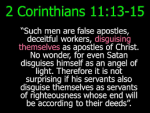Well....its a good time to brush up on the book of James. The second (maybe first) most misunderstood book in all the NT no doubt.
https://www.sermonaudio.com/solo/cliffside/sermons/52919654562847/
https://www.sermonaudio.com/solo/cliffside/sermons/92212148263/
https://www.sermonaudio.com/solo/cliffside/sermons/83112127523/
https://www.sermonaudio.com/solo/cliffside/sermons/52919654562847/
https://www.sermonaudio.com/solo/cliffside/sermons/92212148263/
https://www.sermonaudio.com/solo/cliffside/sermons/83112127523/
You need to FF the first lecture by at least 50%.
To my knowledge, nobody here on CC has yet to correctly exegete James ch 2.
You are basically dealing with love of wealth materialistic unbelieving pharisaism vs love of God faith based believing.
The pharisaic frauds LOVE their wealth and DO NOT in fact edify the Body with it.......they hoard wealth to themselves.
A perfect complement to the rest of the Bible as it speaks to this matter.
-
1
- Show all

